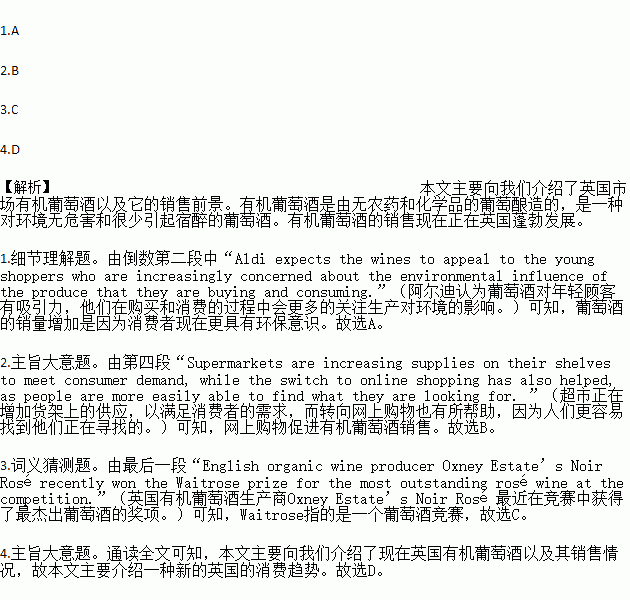题目内容
It is made from grapes grown without pesticides (杀虫剂) and chemicals, is kind to the environment and rarely causes hangovers (酒后头痛). Sales of organic wine are booming in the UK.
According to the organic food and farming group Soil Association, sales of organic beers, wines and spirits rose by 14.3% last year to reach nearly £6 million, driven by the demand from consumers who are increasingly seeking “natural” food.
“It seems that people are rediscovering their link with the environment through organic food. Organic wines also taste better, perhaps due to less use of man-made chemicals.” said Finn Cottle of Soil Association. As well as the benefits of producing grapes without using pesticides, organic wine also contains less sulphur dioxide (二氧化硫), which can contribute towards hangovers.
Supermarkets are increasing supplies on their shelves to meet consumer demand, while the switch to online shopping has also helped, as people are more easily able to find what they are looking for. Vintage Roots is now one of the UK’s biggest online shops of organic wine, while Ocado provides more than 100 different organic wines and Daylesford, best-known for its organic vegetable boxes, has branched out into organic wine and spirits.
The discount supermarket Aldi is set to start its first collection of so-called “green” wines this week, offering eight wines with organic certificates. Aldi expects the wines to appeal to the young shoppers who are increasingly concerned about the environmental influence of the produce that they are buying and consuming.
English organic wine producer Oxney Estate’s Noir Rosé recently won the Waitrose prize for the most outstanding rosé wine at the competition. A spokeswoman for Waitrose said: “Organic wine is a growing trend globally and we have seen sales increase by 16% in the last year”.
1.Sales of organic wine are increasing probably because ________.
A. consumers are now more environmentally aware
B. it offers a very different taste from traditional wine
C. consumers are tired of hangovers after drinking
D. it contains no sulphur dioxide or pesticide
2.What’s the main idea of paragraph 4?
A. UK supermarkets welcome organic wine and spirits.
B. Online shopping promotes the sales of organic wine.
C. There’re not enough supplies of organic wine in the UK.
D. Supermarkets should go online to sell more wine.
3.“Waitrose” in the last paragraph is probably ________.
A. a wine producer B. an organic wine
C. a wine competition D. a news agency
4.The writing purpose of the text is to ________.
A. persuade readers to go green while drinking
B. compare organic wine and traditional wine
C. share with readers wines without hangovers
D. introduce a new consuming trend in the UK
 名校课堂系列答案
名校课堂系列答案

 now what I mean.
now what I mean.